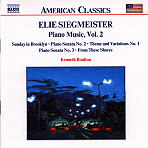If you’re encountering the late American, New York born composer Elie Siegmeister for the first time, skip the first five tracks for now. Cue up Track Six to his gritty, uncompromising 1964 Second Sonata. The one movement work commences with stabbing, isolated pitches. These work their way into petulant clusters and stark, flickering triads. Leaping rhythmic patterns forge a grim, motoric path of no return, on which teasing jazz flourishes and starburst, two-handed arpeggios provide breezy relief. Siegmeister’s predilection for granitic sonorities and bleak lyricism informs both his early 1932 Theme & Variations and his notey, rigorous Third Sonata from 1979. Five movements from the 1985 suite “These Shores” depict a quintet of American writers, whose identities are difficult to decipher without a score card. Yet this composer could write simple, accessible music too. Turn now to the opening “Sunday in Brooklyn” suite, a five movement work laced with wistful tunes and gentle, wrong-note Gershwinisms. This is music that deserves to be played much more than it is. One regrets that the composer, who died in 1991, didn’t live to hear pianist Kenneth Boulton’s dynamically charged, fiercely committed, and brilliantly virtuosic performances. He would have been delighted.
































